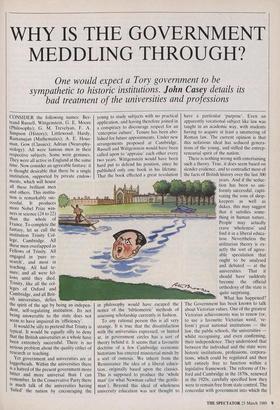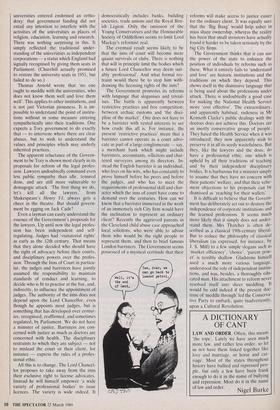WHY IS THE GOVERNMENT MEDDLING THROUGH?
One would expect a Tory government to be
sympathetic to historic institutions. Jahn Casey details its
bad treatment of the universities and professions
CONSIDER the following names: Ber- trand Russell. Wittgenstein, G. E. Moore (Philosophy); G. M. Trevelyan, F. A. Simpson (History); Littlewood, Hardy, Ramanujan (Mathematics); A. E. Hous- man, Gow (Classics); Adrian (Neurophy- siology). All were famous men in their respective subjects. Some were geniuses. They were all active in England at the same time. Now consider an agreeable fantasy: it IS thought desirable that there be a single institution, supported by private endow- ments, which will house It would be silly to pretend that Trinity is typical. It would be equally silly to deny that the British universities as a whole have been extremely successful. There is no serious problem about the quality either of research or teaching.
Yet government and universities are at loggerheads. Within the universities there ls.a hatred of the present government more bitter and more universal than I can remember. In the Conservative Party there Is much talk of the universities having failed' the nation by encouraging the
young to study subjects with no practical application, and having therefore joined in a conspiracy to discourage .respect for an 'enterprise culture'. Tenure has been abo- lished for future appointments. Under new arrangements proposed at Cambridge. Russell and Wittgenstein would have been called upon to 'appraise' each other every two years. Wittgenstein would have been hard put to defend his position, since he published only one book in his lifetime. That the book effected a great revolution in philosophy would have escaped the notice of the 'bibliometric' methods of assessing scholarship currently in fashion.
To any rational person this is all very strange. It is true that the dissatisfaction with the universities expressed, or hinted at, in government circles has a sort of theory behind it. It seems that a favourite doctrine of a few Cambridge economic historians has entered ministerial minds by a sort of osmosis. We inherit from the Renaissance the idea of a liberal educa- tion, originally based upon the classics. This is supposed to produce the 'whole man' (or what Newman called 'the gentle- man'). Beyond this ideal of wholeness university education was not thought to have a particular 'purpose'. Even an apparently vocational subject like law was taught in an academic way, with students having to acquire at least a smattering of Roman law. The current opinion is that this nefarious ideal has seduced genera- tions of the young, and stifled the entrep- reneurial spirit of the nation.
There is nothing wrong with entertaining such a theory. True, it does seem based on slender evidence, and to contradict most of the facts of British history over the last 300 years. And if the seduc- tion has been so uni- formly successful, capti- vating the sons of shop- keepers as well as , dukes, this may suggest that it satisfies some- thing in human nature. People may actually crave 'wholeness' and find it in a liberal educa- tion. Nevertheless the utilitarian theory is ex- actly the sort of agree- able speculation that ought to be analysed and debated — at the universities. That it should have suddenly become the official orthodoxy of the state is quite surprising.
What has happened? The Government has been known to talk about Victorian values. One of the greatest Victorian achievements was to renew (or, to use a favourite Victorian word, 're- form') great national institutions — the law, the public schools, the universities — whilst recognising, and even confirming, their independence. They understood that between the individual and the state were historic institutions, professions, corpora- tions, which could be regulated and then left entirely free to function within a legislative framework. The reforms of Ox- ford and Cambridge in the 1870s, renewed in the 1920s, carefully specified how they were to remain free from state control. The concordat with government into which the universities entered enshrined an ortho- doxy: that government funding did not entail any intention to interfere with the activities of the universities as places of religion, education, learning and research. There was nothing surprising in this. It simply reflected the traditional under- standing of the universities as independent corporations — a status which England had signally recognised by giving them seats in Parliament. (Churchill actually promised to restore the university seats in 1951, but failed to do so.) Thomas Arnold wrote that `no one ought to meddle with the universities, who does not know them well and love them well'. This applies to other institutions, and is not just Victorian piousness. It is im- possible to understand the point of institu- tions without in some measure entering sympathetically into their traditions. One expects a Tory government to do exactly that — to intervene where there are clear abuses, but to wish to understand the values and principles which may underly inherited practices.
The apparent reluctance of the Govern- ment to be Tory is shown most clearly in its proposals for reform of the legal profes- sion. Lawyers undoubtedly command even less public sympathy than idle, tenured dons, and are still more vulnerable to demagogic attack. 'The first thing we do, let's kill all the lawyers,' from Shakespeare's Henry 1//, always gets a cheer in the theatre. But should govern- ment be egging on Jack Cade?
Even a layman can easily understand the essence of the Government's proposals for the lawyers. Up until now the legal profes- sion has been independent and self- regulating. Judges had `visitatorial rights' as early as the 12th century. That means that they alone decided who should have the right of advocacy before their courts, and disciplinary powers over the profes- sion. Through the Inns of Court in particu- lar, the judges and barristers have jointly assumed the responsibility to maintain standards of conduct and learning, to decide who is fit to practise at the bar, and, indirectly, to influence the appointment of judges. The authority of the inns does not depend upon the Lord Chancellor, even though he appoints most judges, but is something that has developed over centur- ies, recognised, reaffirmed, and sometimes regulated, by Parliament. We do not have a minister of justice. Barristers are con- cerned with justice as much as doctors are concerned with health. The disciplinary restraints to which they are subject — not to mislead the court or their client, for instance — express the rules of a profes- sional ethic.
All this is to change. The Lord Chancel- lor proposes to take away from the inns their exclusive right to license advocates. Instead he will himself empower 'a wide variety of professional bodies' to issue licences. The variety is wide indeed. It democratically includes banks, building societies, trade unions and the Royal Brit- ish Legion. Only the omission of the Young Conservatives and the Honourable Society of Oddfellows seems to limit Lord Mackay's reformist zeal.
The eventual result seems likely to be that the inns of court will become mere quaint survivals or clubs. There is nothing that will in principle limit the bodies which a future Lord Chancellor may deem suit- ably 'professional'. And what formal res- traint would there be to stop him with- drawing the licensing rights of the inns?
The Government promotes its reforms with language that sloganises and trivial- ises. The battle is apparently between restrictive practices and free competition; between archaic customs and 'the disci- pline of the market'. One does not have to be a barrister with vested interests to see how crude this all is. For instance, the present 'restrictive practices' mean that a barrister cannot operate as a court advo- cate as part of a large conglomerate — say, a merchant bank which might include barristers, accountants, solicitors and char- tered surveyors among its directors. In- stead the English barrister is an individual, who lives on his wits, who has constantly to prove himself before his peers and before the judges, and who has to meet the requirements of professional skill and char- acter which the inns of court have come to demand over the centuries. How can we know that a barrister immersed in the work of an immensely rich City firm would have the inclination to represent an ordinary client? Recently the aggrieved parents in the Cleveland child abuse case approached local solicitors, who were able to advise them who would be the right people to represent them, and then to brief famous London barristers. The Government seems possessed of a mystical certitude that their
reforms will make access to justice easier for the ordinary client. It was equally sure that the 'Big Bang' would help usher in mass share ownership, whereas the reality has been that small investors have actually found it harder to be taken seriously by the big City firms.
The Government thinks that it can use the power of the state to enhance the position of individuals by reforms such as these. What it entirely fails to 'understand and love' are historic institutions and the traditions on which they depend. This shows itself in the dismissive language that is being used about the professions under attack. There is undoubtedly a good case for making the National Health Service more 'cost effective'. The extraordinary, and apparently habitual, rudeness in Mr Kenneth Clarke's public dealings with the doctors does not achieve this. Doctors are an inertly conservative group of people. They hated the Health Service when it was introduced; they now apparently wish to preserve it in all its seedy wastefulness. But they, like the lawyers and the dons, do have a professional ethic, one which is upheld by all their traditions of teaching and by their independent disciplinary bodies. It is barbarous for a minister simply to assume that they have no concern with their patients' welfare, and that their vehe- ment objections to his proposals can he dismissed as 'reaching for their wallets'.
It is difficult to believe that the Govern- ment has deliberately set out to destroy the independence of corporate institutions and the learned professions. It seems much more likely that it simply does not under- stand them. Mrs Thatcher is often de- scribed as a classical 19th-century liberal. But to reduce the philosophy of classical liberalism (as expressed, for instance, by J. S. Mill) to a few simple slogans such as 'market efficiency', 'choice', 'parent pow- er' is terribly shallow. Gladstone himself used a much more various language, understood the role of independent institu- • tions, and was, besides, a thoroughly edu- cated man. His attachment to reform never resolved itself into sheer meddling. It would be odd indeed if the present doc- trine of 'meddle through' led the Conserva- tive Party to embark, quite inadvertently, upon a Cultural Revolution.



















































 Previous page
Previous page